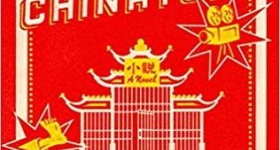The combination of travel and food is always alluring. There
are countless travelogues, cookbooks, and documentaries bringing diverse
cultures of the world together with exciting cuisines in adventurous, often
romantic storylines. Jen Lin-Liu’s On the
Noodle Road: From Beijing to Rome with Love and Pasta delivers that
adventure along with an unsolved mystery of where the noodle originated--was it
Italy, China, or somewhere in between?
Tracing the path of famed Italian
explorer Marco Polo, Lin-Liu embarks on a 6-month journey, traveling the
historic Silk Road in search of the origins of the noodle. On the Noodle Road documents her explorations deconstructing the
plethora of noodle, meat, and dumpling-like dishes enjoyed in China, Central
Asia, Iran, Turkey and Italy. It is a gastronomic journey steeped in the fascinating
history of the Silk Road. Weaved into Lin-Liu’s story is a very striking gender
and identity narrative that makes Lin-Liu’s book unique among food-related
travelogues.
Lin-Liu is a Chinese American author and founder of Black
Sesame Kitchen, an acclaimed cooking school in Beijing. Early on, we learn
of her struggles growing up “Eastern” and “Western.” In her upbringing in
Chicago and Southern California, she describes moments in her youth where she
“wanted blonde hair and didn’t understand why we didn’t go to church like my
friends’ families.” For much of her adult life Lin-Liu lived in China, where
she claims she became more comfortable with her heritage: “But still, every so
often, someone posed the question that had irked me since childhood, a question
that seemed more complicated after I’d lived in China for so long: ‘Where are
you from?’”

The author, Jen Lin-Liu
There are many moments where Lin-Liu is prompted to divulge her
identity with people on her travels. She appears Chinese, speaks Mandarin and
English, but is also American. Before her journey begins, she reflected on
“what it meant to be ‘Eastern’ or ‘Western’—in discovering where on the road
these ideas converged.” Lin-Liu wanted her trip to “help reconcile what I’d
felt were two opposing forces in my life.” This is a laudable quality to the
story. Having an Asian American perspective in this book genre of travel
writing is rewarding—with so few voices on the experiences of traveling as
non-white writer and traveler, readers will appreciate her honesty, humor, and
admirable determination, all while tracing the history of the noodle from China
to Italy.
On the Noodle Road is
a big book. And not just by page length. Ethnicity and nationality are the
layers in which Lin-Liu admirably shares a personal struggle, but there are also
rich descriptions of food and culinary discovery that make the book
multidimensional. I admit, I am deeply envious of the places Lin-Liu is able to
travel to: Western China, Tibet, Kyrgyzstan, and beyond. Her research on the
history of these regions, the cultural diversity of its people, religions and
food, is spectacular. The people we meet provide an insight into everyday life
that is inviting for the reader. We are able to go shopping with the author and
her new friends, picturing in our heads the sights and smells of markets,
vendors or restaurants. I often had to have a snack near me when reading about
the “creamiest of creams” as Lin-Liu describes the best yogurt she’s ever had
in Central Asia, Iran, and Turkey.
Lin-Liu’s quest for the origin of the noodle and her personal
narrative drive this story, but what makes the book stand out among others are
the layers of storytelling about gender. Lin-Liu successfully brings forward
the everyday details in what life is like for women in all areas she visits. In
Kyrgyzstan, she befriends Malika. Lin-Liu tells us frankly, “[T]he truth was, I
was afraid of becoming Malika, a wife burdened with a multitude of household
duties while also juggling a job.” Malika is one of many women Lin-Liu
befriends on her travels, women who are expected to fulfill certain societal
and cultural roles. However, other women in the book, including the author, share
an ambition to succeed, pursue an education, and live independently. In Iran, Lin-Liu
meets many young women who are “more focused on [her] career than on getting
married and having children right away…a point of view that made Iran seem more
similar to the West than to Central Asia.”
Food is at the core of this story, but—perhaps most
importantly—we learn about the women who are making it. In fact, the story
about the noodle seems to get lost. By the end, there are no clear answers to
the big question about where the noodle originated. I think that’s okay. In the
end, we do learn a great deal about a
variety of foods that are culturally connected to each other. That’s
fascinating. But even more so, Lin-Liu’s book is a portrait of the women who not
only cook the cuisines of their regions, but who also lead full, remarkable
lives.
Andrea Kim Taylor lives
in Seattle and works in the city’s Chinatown-International District.









Comments